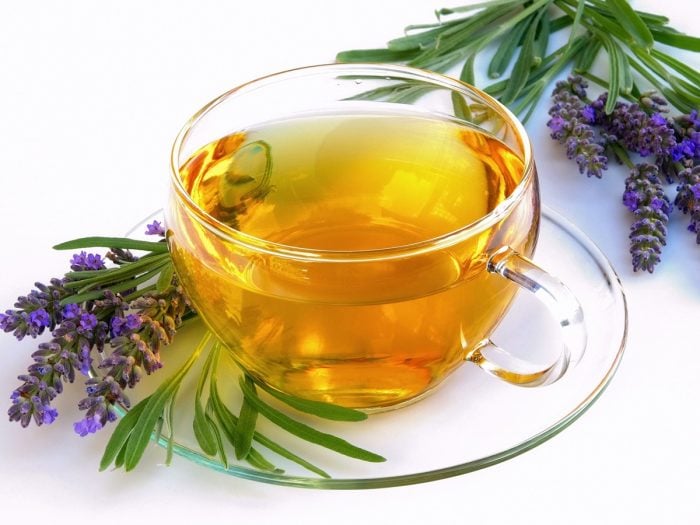Lavender is one of the most beautiful plants in the world. Ranging from lavender essential oil to lavender soaps and scents, this vibrant lilac-colored plant never fails to make a statement. Yet, the most beloved is lavender tea known for its calming effects, which makes it an ideal bedtime tea.
The best benefits of lavender tea may include relaxing the body, reducing muscle spasms, promoting healthy digestion, and aiding sleep. It might also help eliminate inflammation, balance mood, heals the skin and soothes chronic pain.
What is Lavender Tea?
Lavender tea comes from the lavender buds of the flowering plant, the small purple bundles. Scientifically found in the genus Lavandula, lavender is native to the land surrounding the Mediterranean Sea and Southern Europe, ranging from the Middle East to Asian countries. It comprises more than 30 species, dozens of subspecies, and plenty of hybrids and cultivars. [1]
It may have an effective concentration of calcium, iron, vitamin A, and phenolic compounds, and potent terpenes, such as linalool. These nutrients can have several notable effects on human health.
Lavender Tea Benefits
When you drink lavender tea, it may provide relief from insomnia, high anxiety, gastrointestinal upset, skin irritation, and headaches. Regardless of what ails you, the benefits of lavender tea will likely be able to help!

Lavender tea boasts a distinctive flavor and an aromatic fragrance. Photo Credit: Shutterstock
May Reduce Stress Levels
The natural soothing qualities of lavender tea and its active components make it ideal for people who suffer from chronic stress and anxiety. It can stimulate the release of neurotransmitters that offset the excess stress hormones in your body, preventing mental exhaustion. Similarly, the use of this tea may also show analgesic effects, making your body and mind less sensitive to painful stimuli. [2]
May Improve Skin Condition
The antioxidants and volatile compounds found in lavender might seek out and neutralize free radicals in the body, which are the byproducts of cellular metabolism. These free radicals can cause chronic disease, premature signs of aging, wrinkles, and inflammation, but lavender tea may help relieve those symptoms, improving your skin texture. [3]
May Reduce Inflammation
Lavender tea has a long list of inflammatory conditions it might counter, including headaches, fevers, skin irritation, arthritis pain, and certain joint disorders. Inflammation can come in many different forms and lead to oxidative stress, but the active compounds in this tea may effectively stop the body’s natural responses. [4]
May Eliminate Sleep Disorders
Many people prefer to drink this tea in the evening, as a pre-bedtime beverage, because it has calming properties. If you have insomnia or regular sleep disturbances, a warm cup of lavender tea may grant an undisturbed night of sleep effortlessly! [5]
Other Benefits
Since there are limited studies available on lavender tea, here are some benefits based on the properties of lavender extract:
- May Improve Digestive health: The essential oils found in lavender tea may have beneficial properties to promote healthy digestion. [6]
- May Relieve asthma: Research suggests that lavender essential oil might be antiseptic and anti-inflammatory. It may be useful as an alternative medicine for bronchial asthma. [7]
- Aromatherapy: Lavender is used in bath and beauty products and as an essential oil for its pleasant fragrance and soothing qualities. [8]
Lavender Tea Recipe
Making lavender tea at home is a simple process, involving only fresh lavender buds and water, although some people enjoy blending the tea with honey, chamomile, or even other forms of tea such as lavender milk tea. Let us look at the recipe below:

Homemade Lavender Tea Recipe
Ingredients
- 4 tsp of fresh lavender buds
- 2 cups of water (filtered)
- 1 tsp of honey (to taste, if desired)
Instructions
- To make lavender tea, add the fresh or dried lavender buds to a teacup.
- Bring the water up to a boil, then remove from heat for 1 minute.
- Pour the water over the lavender buds and allow them to steep for 5 minutes. Place a plate over the top to keep the steam inside the mug, further infusing the tea.
- Remove the plate, add honey if you want to sweeten the flavor, and enjoy! No need to strain the lavender buds out; most will have sunk to the bottom of the cup.
Notes
Side Effects of Lavender Tea
The main side effects of lavender tea may include skin irritation, nausea, vomiting when consumed in excess, but there are other possible interactions and situations to be wary of lavender tea. Lavender tea may cause headaches, constipation, and also appetite change if not taken in moderation. Some of the side effects can be quite serious when the lavender is ingested in a toxic amount. [9]
- Pregnancy: When pregnant, using lavender is not recommended, as it can stimulate menstruation, which can lead to a miscarriage or other complications in pregnant women.
- Low Cholesterol: Due to the cholesterol-lowering properties of this tea, if you are already taking cholesterol medicine, negative interactions may occur.
- Blood Thinners: This tea has anticoagulant properties, which can be good for heart health, but if you are already taking blood-thinning medication, it can be very dangerous, particularly before undergoing surgery.
- Sun Sensitivity: Excessive lavender tea consumption can increase the sun sensitivity of the skin, and may also cause skin irritation and rashes.
If you experience any side effects, it is advisable to refrain from consuming lavender tea immediately. Also, avoid using it with sedatives as it may lead to drowsiness. If you think you may be at risk for a negative interaction with medication, speak to your doctor before adding this tea to your daily or weekly health regimen.
